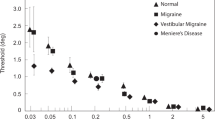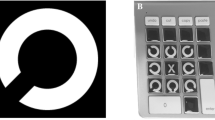Abstract
Patients after vestibular neuritis (VN) often report persistent dizziness and disequilibrium. We correlated persistent symptoms with sustained impairment of the high-acceleration horizontal vestibulo-ocular reflex as determined by quantitative searchcoil head-impulse testing (qHIT). In 47 patients, qHIT was recorded 0–60 months and symptoms assessed with the Yardley Vertigo Symptom Scale short form ≥ 18 months after VN onset. No correlation between the magnitude of high-acceleration vestibular impairment and the severity of vertigo symptoms was observed. The lack of a symptom-qHIT correlation suggests that defective compensation at a more rostral level in the central nervous system may be responsible for protracted symptoms in VN patients.
Similar content being viewed by others
References
Ariyasu L, Byl FM, Sprague MS, Adour KK (1990) The beneficial effect of methylprednisolone in acute vestibular vertigo. Arch Otolaryngol Head Neck Surg 116:700–703
Bergenius J, Perols O (1999) Vestibular neuritis: a follow-up study. Acta Otolaryngologica 119:895–899
Cooper CW (1993) Vestibular neuronitis: a review of a common cause of vertigo in general practice. Br J Gen Pract 43:164–167
Curthoys IS, Halmagyi GM (1995) Vestibular compensation: a review of the oculomotor, neural, and clinical consequences of unilateral vestibular loss. J Vestib Res 5:67–107
Godemann F, Koffroth C, Neu P, Heuser I (2004) Why does vertigo become chronic after neuropathia vestibularis? Psychosom Med 66:783–787
Godemann F, Siefert K, Hantschke- Bruggemann M, Neu P, Seidl R, Strohle A (2005) What accounts for vertigo one year after neuritis vestibularis – anxiety or a dysfunctional vestibular organ? J Psychiatr Res 39:529–534
Grunfeld EA, Morland AB, Bronstein AM, Gresty MA (2000) Adaptation to oscillopsia: a psychophysical and questionnaire investigation. Brain 123:277–290
Guerraz M, Yardley L, Bertholon P, Pollak L, Rudge P, Gresty MA, Bronstein AM (2001) Visual vertigo: symptom assessment, spatial orientation and postural control. Brain 124:1646–1656
Imate Y, Sekitani T (1993) Vestibular compensation in vestibular neuronitis. Long-term follow-up evaluation. Acta Oto-laryngologica 113:463–465
Jacobson GP, McCaslin DL (2003) Agreement between functional and electrophysiologic measures in patients with unilateral peripheral vestibular system impairment. J Am Acad Audiol 14:231–238
Kammerlind AS, Ledin TE, Skargren EI, Odkvist LM (2005) Long-term follow-up after acute unilateral vestibular loss and comparison between subjects with and without remaining symptoms. Acta Oto-laryngologica 125:946–953
Okinaka Y, Sekitani T, Okazaki H, Miura M, Tahara T (1993) Progress of caloric response of vestibular neuronitis. Acta Otolaryngol Suppl 503:18–22
Palla A, Straumann D (2004) Recovery of the high-acceleration vestibuloocular reflex after vestibular neuritis. J Assoc Res Otolaryngol 5:427–435
Schmid-Priscoveanu A, Bohmer A, Obzina H, Straumann D (2001) Caloric and search-coil head-impulse testing in patients after vestibular neuritis. J Assoc Res Otolaryngol 2:72–78
Straumann D, Zee DS, Solomon D, Lasker AG, Roberts DC (1995) Transient torsion during and after saccades. Vision Res 35:3321–3334
Strupp M, Zingler VC, Arbusow V, Niklas D, Maag KP, Dieterich M, Bense S, Theil D, Jahn K, Brandt T (2004) Methylprednisolone, Valacyclovir, or the combination for vestibular neuritis. N Engl J Med 22:354–361
Talkowski ME, Redfern MS, Jennings JR, Furman JM (2005) Cognitive requirements for vestibular and ocular motor processing in healthy adults and patients with unilateral vestibular lesions. Journal of Cognitive Neuroscience 17:1432–1441
Tian J, Crane BT, Demer JL (2000) Vestibular catch-up saccades in labyrinthine deficiency. Exp Brain Res 131:448–457
Yardley L, Beech S, Zander L, Evans T, Weinman J (1998) A randomized controlled trial of exercise therapy for dizziness and vertigo in primary care. Br J Gen Pract 48:1136–1140
Yardley L, Burgneay J, Andersson G, Owen N, Nazareth I, Luxon L (1998) Feasibility and effectiveness of providing vestibular rehabilitation for dizzy patients in the community. Clinical Otolaryngology and Allied Sciences 23:442–448
Yardley L, Masson E, Verschuur C, Haacke N, Luxon L (1992) Symptoms, anxiety and handicap in dizzy patients: development of the vertigo symptom scale. J Psychosom Res 36:731–741
Kim HA, Hong JH, Lee H, Yi HA, Lee SR, Lee SY, Jang BC, Ahn BH, Baloh RW (2008) Otolith dysfunction in vestibular neuritis: recovery pattern and a predictor of symptom recovery. Neurology 70:449–453
Weber KP, Aw ST, Todd MJ, McGarvie LA, Curthoys IS, Halmagyi GM (2008) Head impulse test in unilateral vestibular loss: vestibulo-ocular reflex and catch-up saccades. Neurology 5:454–463
Author information
Authors and Affiliations
Corresponding author
Rights and permissions
About this article
Cite this article
Palla, A., Straumann, D. & Bronstein, A.M. Vestibular neuritis: Vertigo and the high-acceleration vestibulo-ocular reflex. J Neurol 255, 1479–1482 (2008). https://doi.org/10.1007/s00415-008-0935-2
Received:
Revised:
Accepted:
Published:
Issue Date:
DOI: https://doi.org/10.1007/s00415-008-0935-2




